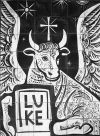
The Gospel of Luke
The Twelve, Lk 9,1-17
The number 12 is prominent in both the outer incidents: in 9,1 & 9,12 for the disciples and then 9,17 for the twelve baskets. There is a bit more to this as we will see shortly.
Herod: 9,7-9
Luke has cut this scene right down to a minimum compared to Mark's lengthy account. There is just a mention of John the Baptist's execution (9,9).
Bringing Herod on scene is a reminder that the secular authorities were interested in Jesus and his activities as well as the religious ones. The focus of the incident is given at the end, where only Luke has Herod wondering just who Jesus is. He is the enemy in the background (13,31) until Pilate sends Jesus to him (23,6-12).
We can note that whilst the twelve are absent, Jesus does no preaching and teaching. The twelve will be witnesses to everything Jesus does (Acts 1,21-22).
The Mission of the Twelve: 9,1-6
"Power and authority", the kingdom of God and the good news all apply to Jesus' own mission (4,36; 4,43). The Twelve are being sent out to share the mission of Jesus and continue what he was doing.
Travelling light (9,3) is an important aspect of discipleship (14,33) as is remaining in one place (9,4): false preachers tend to move about and take what they can from their hosts.
Paul and Barnabas shook the dust from their feet when expelled from Antioch in Pisidia (Acts 13,51), Luke's only other use of this expression.
The overall picture here is of the immediate group of disiples, the Twelve, being already witnesses to Jesus and sharers in his mission. At this stage the group is restricted to the Twelve whose special status as disciples will now be highlighted.
Back now to the main page .
The Feeding: 9,10-17
The word "apostle" means someone who is sent. The verb occurs in 9,2. Here we have the noun which has now become a title, picking up from Jesus' selection of the twelve as apostles in 6,13. These apostles will in due course emerge as leaders of the early Church in the Acts of the Apostles (Acts 1,2 and throughout).
In verse 11, Luke says Jesus welcomed the crowd. The other evangelists (Mk 6,34) speak of Jesus having compassion on the crowd. Luke is also unique in saying that Jesus spoke of the kingdom of God, an echo of 9,2.
Yet the twelve have yet much to learn about the kingdom of God: their attitude in 9,12 is to dismiss the crowd because the of the practical difficulties of feeding the crowd - and where, one wonders, are the villages and farms in a deserted place. A desert recalls God feeding his people in the desert (Ex 16,2).
In verse 13, the twelve immediately note the available food before the comment about buying food "for all these people" which is another Lucan emphasis. Then in verse 14, Luke heightens the issue by mentioning the numbers involved. (Only in John's Gospel does Jesus take the initiative at this point and there Jesus is specifically testing his disciples (Jn 6,6)).
In verse 16, the actions of Jesus are the same as his words over the bread at the last supper: took, blessed/thanked, broke and gave (22,19). He will use the same words again at Emmaus after the resurrection (24,30). The connection with the Eucharist could not be clearer, though by the end of the episode we will see that more is involved.
The disciples then serve the food. At the Last Supper, Jesus will remind them that he among them as one who serves (22,27).
All the evangelists have twelve baskets of left-overs. The abundance of the gift is evident. Luke though by referring to the apostles (9,10) as the Twelve invites the connection: as a commentator once put it: "the "twelve" baskets obviously has a symbolic reference to the "Twelve" in verse 12; they each bring back a basketful and now have enough to feed still others." Which neatly brings us back to Jesus' commission to the Twelve (aka the Apostles) at the beginning, 9,1-6.
The result at the end in 9,17 is that stress on the gift. By making noting the numbers of men earlier in the episode, Luke has not only highlighted the need in verse 14 but left the story open ended (as he likes to do). There are others to be fed: 6,21 is the beatitude that the hungry will be filled.
Back to the main page and so on to the centre of this chapter.
